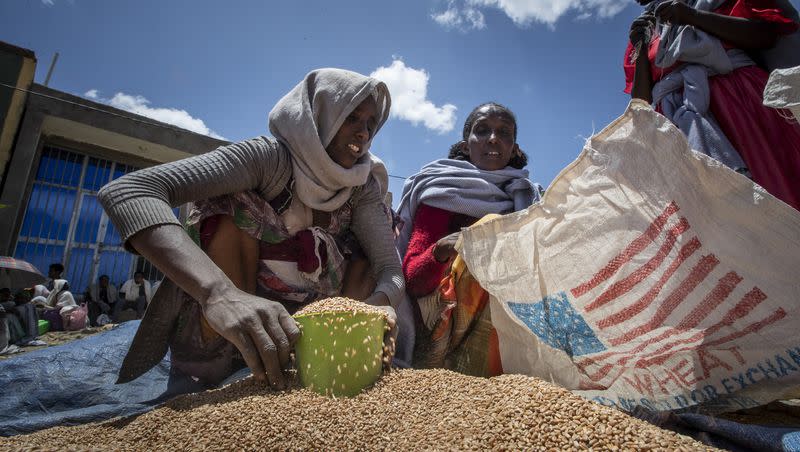After a massive grain theft scheme, food is slowly returning to Ethiopia

Nearly five months after suspending food aid in Ethiopia because of a massive scheme to steal donated grain, the United Nations World Food Program has begun testing small distribution programs in some areas of Ethiopia.
As the World Food Program begins food deliveries to approximately 100,000 people out of 20 million impacted by the suspension, The Associated Press reports that officials have added new security measures. These include digitally registering people receiving the aid, adding additional markings to grain sacks, implementing hotlines and increasing the training for aid partners.
Grand scale theft
According to The Associated Press, the first to report the story in early May, the grain was stolen from the Tigray region, after fighting between government troops and Tigrinya fighters slowed in November and February.
From a single warehouse in Tigray enough food to feed more than 130,000 people was stolen, then sold. Bags of grain still marked with the U.S. flag were found for sale in local markets, at prices out of reach for the people it was meant to help.
U.S. officials believe it could be the largest ever diversion of food aid and that the Ethiopian government was “deeply involved.”
Related
Doctors are begging for food in war-torn Tigray amid Ethiopia civil war
Despite peace talks, Ethiopians are being trafficked, raped and killed
Stopping aid
On April 20, 2023, the World Food Program informed its humanitarian partners that it was suspending deliveries of food aid to the Tigray region because it had uncovered wide-spread theft. Less than two weeks later, the United States Agency for International Development said they were also suspending aid.
The Associated Press reported that USAID Administrator Samantha Power said her agency “uncovered that food aid, intended for the people of Tigray suffering under famine-like conditions, was being diverted and sold on the local market” and appeared to involve “collusion between parties on both sides of the conflict.”
A document prepared by the Humanitarian and Resilience Donor group also pointed to a multifaceted plot. “The scheme appears to be orchestrated by federal and regional government of Ethiopia entities, with military units across the country benefitting from humanitarian assistance,” reported The Associated Press in early June.
The background
The people who need the food aid the most are also most affected by the stoppage. After several years of civil war and extended drought, some 20 million people countrywide were accessing food aid. In the Tigray region, virtually all of the 6 million residents rely on international food aid. Now they are starving.
According to reporting by The Associated Press, the main hospital in Tigray saw a 28% increase in the number of children admitted for malnutrition in March and April. In Axum, the increase was 96%.
By the end of June, local officials had reported at least 700 deaths related to hunger. USAID sent an “unusually strong statement” to The Associated Press, calling the aid suspension “absolutely wrenching” and a measure of last resort because of the “extreme scale and coordination of food aid diversion identified across the country.”
As the World Food Program, funded by the World Bank, resumes sending food aid on a much smaller scale, USAID is not yet ready to join them. Its suspension of food aid will continue while it negotiates with Ethiopia’s government for reforms of a system long controlled by local authorities.
Secretary of State Antony Blinken has spoken with Prime Minister Abiy Ahmed to “drive progress on these issues.”
Holly Richardson is the editor of Utah Policy.

